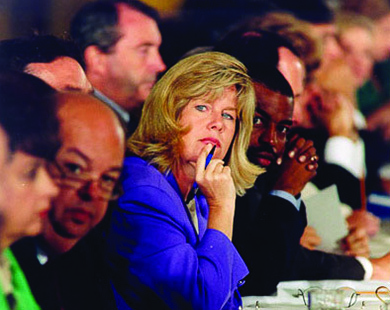| << Chapter < Page | Chapter >> Page > |
Reagan’s political calculations notwithstanding, his belief that traditional values were threatened by a modern wave of immoral popular culture was genuine. He recognized that nostalgia was a powerful force in politics, and he drew a picture for his audiences of the traditional good old days under attack by immorality and decline. “Those of us who are over thirty-five or so years of age grew up in a different America,” he explained in his farewell address. “We were taught, very directly, what it means to be an American. And we absorbed, almost in the air, a love of country and an appreciation of its institutions. . . . The movies celebrated democratic values and implicitly reinforced the idea that America was special.” But this America, he insisted, was being washed away. “I’m warning of an eradication of the American memory that could result, ultimately, in an erosion of the American spirit.”
Concern over a decline in the country’s moral values welled up on both sides of the political aisle. In 1985, anxiety over the messages of the music industry led to the founding of the Parents Music Resource Center (PMRC), a bipartisan group formed by the wives of prominent Washington politicians including Susan Baker, the wife of Reagan’s treasury secretary, James Baker, and Tipper Gore, the wife of then-senator Al Gore, who later became vice president under Bill Clinton. The goal of the PMRC was to limit the ability of children to listen to music with sexual or violent content. Its strategy was to get the recording industry to adopt a voluntary rating system for music and recordings, similar to the Motion Picture Association of America’s system for movies.
The organization also produced a list of particularly offensive recordings known as the “filthy fifteen.” By August 1985, nearly twenty record companies had agreed to put labels on their recordings indicating “explicit lyrics,” but the Senate began hearings on the issue in September ( [link] ). While many parents and a number of witnesses advocated the labels, many in the music industry rejected them as censorship. Twisted Sister ’s Dee Snider and folk musician John Denver both advised Congress against the restrictions. In the end, the recording industry suggested a voluntary generic label. Its effect on children’s exposure to raw language is uncertain, but musicians roundly mocked the effort.

Listen to the testimony of Dee Snider and John Denver to learn more about the contours of this debate.
In the early 1980s, doctors noticed a disturbing trend: Young gay men in large cities, especially San Francisco and New York, were being diagnosed with, and eventually dying from, a rare cancer called Kaposi’s sarcoma. Because the disease was seen almost exclusively in male homosexuals, it was quickly dubbed “gay cancer.” Doctors soon realized it often coincided with other symptoms, including a rare form of pneumonia, and they renamed it “Gay Related Immune Deficiency” (GRID), although people other than gay men, primarily intravenous drug users, were dying from the disease as well. The connection between gay men and GRID—later renamed human immunodeficiency virus/autoimmune deficiency syndrome, or HIV/AIDS —led heterosexuals largely to ignore the growing health crisis in the gay community, wrongly assuming they were safe from its effects. The federal government also overlooked the disease, and calls for more money to research and find the cure were ignored.

Notification Switch
Would you like to follow the 'U.s. history' conversation and receive update notifications?